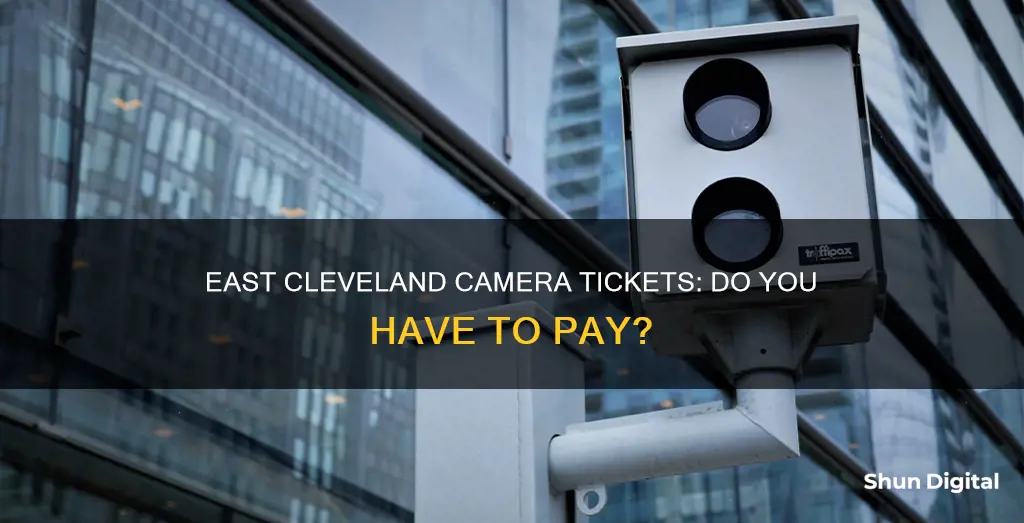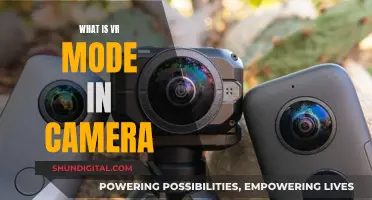
The use of traffic cameras in East Cleveland, Ohio, has sparked debate among residents, with many questioning the legality of fines issued by the East Cleveland Police Department. While some choose to pay the fines, others, like Chris Jones, have contested their tickets. Ohio law states that a warning sign must be posted within 300 feet of a photo light, and an officer must be present with the camera device. However, the absence of warning signs and the difficulty in identifying the presence of an officer at the time the photo was taken have led to concerns about the validity of these tickets. As the Ohio Supreme Court examines the constitutionality of the law, the debate continues, leaving residents unsure about whether they are legally obligated to pay the camera tickets issued in East Cleveland.
| Characteristics | Values |
|---|---|
| Ticket Cost | $95 |
| Warning Signs | Not always present |
| Legality | Questioned |
| Fighting the Ticket | Could cost more than double the ticket amount |
| Not Paying the Fine | The city could treat it like an unpaid parking ticket |
What You'll Learn

Legality of tickets from unmanned traffic cameras
The legality of tickets from unmanned traffic cameras is a complex and evolving issue that varies by state and local jurisdiction in the United States. While the use of traffic cameras for enforcing traffic laws is widespread, it remains a highly controversial practice. The controversy arises from concerns related to public safety, privacy, and drivers' rights.
In the specific case of East Cleveland, Ohio, the use of traffic cameras has generated revenue for the city, but it has also faced criticism for not following warning rules. According to a news report from 2019, there were instances where warning signs were missing or not properly placed near traffic cameras, leading to questions about the city's compliance with the law.
The legality of tickets from unmanned traffic cameras depends on several factors, including state and local regulations, the placement and operation of the cameras, and the procedures for issuing and enforcing the tickets.
State laws play a crucial role in determining the legality of these tickets. Some states have specific laws permitting or restricting the use of traffic cameras for speed enforcement or red-light violations. For example, states like Arizona, California, and Ohio allow the use of cameras for enforcing speed limits and red lights, while states like Texas and Utah have prohibitions in place. Other states, like Alabama and Delaware, permit the use of speed or red-light cameras within specific jurisdictions.
Local regulations and ordinances also come into play. For instance, local governments in some states are allowed to set up individual camera programs within their jurisdiction. On the other hand, some states ban automated traffic cameras altogether or limit their use to certain areas, such as school zones or work zones.
The placement and operation of the cameras are important considerations. In some cases, there may be requirements for warning signs to be posted near traffic cameras, as seen in the East Cleveland example. Additionally, the use of unmanned camera evidence for issuing tickets may be subject to specific criteria, such as clearly capturing a vehicle's position before and after a stop line for red-light violations.
The procedures for issuing and enforcing the tickets also impact their legality. In some states, a certified law enforcement officer must review the evidence before a violation notice is sent to the alleged violator. There may be specified time frames for issuing the notice and paying the fine.
It is important to note that state laws and regulations are subject to change, and consulting with a local attorney or conducting legal research is advisable to understand the current legality of tickets from unmanned traffic cameras in a specific jurisdiction.
Acti Cameras: Where Are They Manufactured?
You may want to see also

The requirement for an officer to be present with the camera device
In East Cleveland, Ohio, the use of traffic cameras to enforce speeding and red-light violations has been a controversial issue. While some argue that these cameras improve road safety and free up police resources, others view them as a revenue-generating scheme that unfairly targets low-income drivers.
One of the key points of contention surrounding the use of traffic cameras in East Cleveland is the requirement for an officer to be present with the camera device. According to Eric Brewer, the East Cleveland Clerk of City Council, the cameras must be utilised while a police officer is present and on the scene. This requirement is based on State of Ohio guidelines, which specify that officers should authenticate the tickets on the spot. However, Brewer alleges that this is not happening in practice.
The presence of an officer is intended to provide immediate accountability and due process for alleged traffic violations. Without an officer on-site, the validity of the tickets may be called into question, as there is no opportunity for drivers to explain or dispute the violation before receiving a fine. This concern is heightened when considering the potential impact of these tickets on driving records and insurance rates.
In the case of Joann Gibson, who received a speeding ticket while her van was being towed, the absence of an officer to review the violation led to an erroneous ticket being issued. This incident highlights the potential for errors and the importance of having an officer present to verify that a violation has indeed occurred.
The requirement for an officer's presence at the scene of a traffic camera is a critical aspect of ensuring fairness and accuracy in the enforcement of traffic laws. It allows for immediate review and verification of violations, providing drivers with an opportunity to address any discrepancies or mitigating circumstances. While the presence of an officer may not always be feasible or practical, it is an important consideration in balancing the use of technology with the rights of citizens.
Trail Cameras: Raw vs JPEG Image Formats
You may want to see also

The legality of ignoring a ticket
In East Cleveland, Ohio, there have been complaints about traffic cameras generating revenue without following warning rules. Motorists are expected to pay fines for tickets received from these cameras, but what happens if you ignore a ticket?
Ignoring a traffic ticket is not advisable as it can lead to several negative consequences. Firstly, the court will mark the ticket as a failure to appear or respond, known as an FTA. This goes on your driving record and is sent to the Department of Licensing (DOL). An FTA on your record can result in a license suspension, especially if the violation involves a moving violation. To reinstate your license, you will need to resolve the FTA by paying the fine, along with an additional default penalty, or setting up a payment plan with the collection agency or the court.
If you choose to ignore the penalties, the court will send the case to a collection agency, further damaging your financial standing and credit score. Additionally, the DOL will be notified, and your license may be suspended until all penalties are paid. Paying the ticket fine without contesting it is an admission of guilt, and the ticket will remain on your record, potentially impacting insurance rates and employment opportunities.
To avoid these consequences, it is recommended to request a contested hearing to fight the ticket. However, this must be done promptly, usually within 15 days of receiving the ticket, and the process may vary depending on the court. Consulting an attorney is advisable, as these cases often hinge on technical issues that a legal professional can better navigate. While it is challenging to have a hearing after paying the ticket, you may still petition the court for a review and request relief from judgment.
Unleash Camera Raw: Bridge's Hidden Gem
You may want to see also

The legality of speed camera tickets
In 2015, a new law in Ohio added restrictions on the use of traffic cameras, requiring an officer to be present and stationed by the camera device. This has raised questions about the legality of tickets issued by unmanned traffic cameras in East Cleveland. According to defense attorney Adam VanHo, "Right now, the law is that the officer has to be present when the photo is actually taken. There is some question until the Ohio Supreme Court rules on the constitutionality of the law, but as of right now, East Cleveland needs to have those posts manned."
The absence of warning signs near the traffic cameras further complicates the issue. Chris Jones, who received a ticket for not fully stopping while making a right turn, pointed out the lack of proper signage, as required by law. Without these signs, some argue that the cameras are merely a way for the city to generate revenue rather than promote road safety.
While some individuals choose to pay the fine to avoid legal complications, others, like Sean Mellino, question the legality of the tickets and consider fighting them in court. However, as attorney Adam VanHo points out, even if individuals choose not to pay, the city could treat it similarly to an unpaid parking ticket, and it would still cost time and money to dispute it.
The debate continues as the Ohio Supreme Court examines the constitutionality of the new law. If the law is found to be constitutional, East Cleveland may be required to refund the money collected from illegal tickets. In the meantime, residents are left with the decision to pay the fines or challenge the legality of the speed camera tickets.
Understanding Camera Raw's Native Resolution
You may want to see also

The legality of traffic camera tickets
Some states ban automated traffic cameras altogether, while others limit how and where law enforcement can use them. Some allow local governments to set up individual camera programs, and some permit cameras to enforce speed limits, red lights, or both. A few states don't address the use of red light and speed cameras at all.
In Ohio, where East Cleveland is located, traffic cameras are permitted for speed enforcement or red-light violations, but a police officer must be present.
In East Cleveland, there have been complaints about the use of traffic cameras, with some claiming that they are being used as a revenue stream rather than to improve safety. One driver, Chris Jones, received a ticket for not fully stopping while making a right turn. He argued that there was no warning sign posted at the busy intersection, which is a requirement under Ohio law.
While some people simply pay the fine, Jones took a different approach and researched the law. He found that a warning sign should be posted within 300 feet of any photo light, which was not the case at the intersection where he received his ticket. Without the sign, Jones claimed that the camera was nothing more than a "cash grab."
It is important to note that the legality of traffic camera tickets can be complex and may vary depending on specific circumstances and local regulations. It is always advisable to consult with a legal professional for specific guidance.
GoPro 4 Charger Cord: What Size Do You Need?
You may want to see also
Frequently asked questions
It depends. Some people have reported ignoring tickets and suffering no consequences, while others have reported receiving multiple letters and threats of legal action. Some have paid the fine upfront to avoid the hassle of a court battle.
If you don't pay the fine, the city could treat it like an unpaid parking ticket. There is a chance that it could be sent to a collection agency and affect your credit report.
The legality of East Cleveland camera tickets has been questioned due to the lack of warning signs and the absence of an officer present when the photo is taken. However, city officials maintain that they are following the law. The Ohio Supreme Court is reviewing the constitutionality of the law regarding this issue.
Ignoring an East Cleveland camera ticket could result in multiple letters and threats of legal action. The city may treat it as an unpaid parking ticket, and there is a chance that it could be sent to a collection agency, potentially impacting your credit report. Fighting the ticket in court may also cost you time and money.







